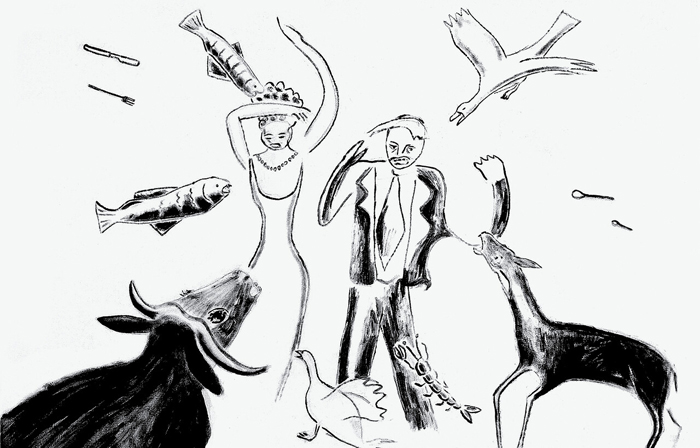Press Release
We all know many stories about animals; they are part of our collective imagination. Since our childhood, we have spent time observing animals in various situations. Many of us have also formed personal opinions about them. Animals are probably among the most popular and, at the same time, the most complex subjects to have accompanied us since our species emerged. Humans are evolving along with animals, which is why our attitude towards them has changed throughout history.

International Archives 1st half of 2024
The Lives of Animals
M HKA, Antwerp (Belgium)
08.06 - 22.09.2024

In the last two decades, animal studies have emerged worldwide as a new academic discipline. Scientists engage in questions regarding concepts of “animality,” “animalisation’, or “becoming animal” to investigate human-
It is important to mention that the origins of the animal rights movement can be found in nineteenth-
The exhibition The Lives of Animals looks at the subject of animals from the perspective of the visual arts, asking the fundamental question about what an animal is and whether humans can be friends with animals. Participating artists critically examine the attitudes of “human exceptionalism,” stemming from the belief that animals do not understand the concept of death or have a sense of the future.
The title of the exhibition refers to the fictocritical novel by J.M. Coetzee, The Lives of Animals. The text is an unusual and polemic form of philosophical dialogue, in which two lectures given by the main fictional character, the literary scholar Elizabeth Costello, are interwoven with the narrative plot. Coetzee presents various viewpoints on the matter of animals. Often, these are perspectives that are extremely polarised, which gives the novel an exceptionally contemporary character, reflecting the dynamics of the public debate on the subject of animals. The protagonist of the novel discusses the foundations of human morality, referring to the ethics of compassion and poetic invention (the ability to imagine oneself as someone else). Empathy and kindness, spoken of by Costello, become the starting point for the present exhibition, which proposes an interdisciplinary approach. It blends literature, philosophy, ethics, and the visual arts to explore and challenge conventional perceptions about animals, whilst encouraging visitors to rethink their relationship with them.
The exhibition begins with the works of artist Lin May Saeed (1973–2023), who dedicated her entire artistic creativity to the subjects of animal liberation, domestication, and cohabitation. Her work, which examines complex, transcultural relationships between humans and animals, has become one of the most important starting points for the creation of this project.
The exhibition adheres to an ethical code. Therefore, it does not include taxidermy, living animals, or acts of violence against them. Animals are the main protagonists of the exhibition, focusing on their biographies and uniqueness whilst simultaneously questioning how gestures of empathy, kindness, and love towards them might be constituted.
Can we, and under what circumstances, adopt an animal perspective?
Artists: Noor Abuarafeh, Antonia Baehr, Yevgenia Belorusets, Pierre Bismuth, melanie bonajo, Elen Braga, Sue Coe, Simone Forti, Nicolás García Uriburu, Piero Gilardi, Golden Snail Opera Collective, Rebecca Horn, Katarzyna Krakowiak, K.P. Krishnakumar, Luís Lázaro Matos, Laura Lima, Anne Marie Maes, Dafna Maimon, Britta Marakatt-
Curated by Joanna Zielińska.
Lin May Saeed, The Arrival of the Animals (dedicated to E. Canetti), 2008. Courtesy of the Estate of Lin May Saeed and Jacky Strenz, Frankfurt/Main.

Exhibition 08 June -

© ArtCatalyse International / Marika Prévosto 2024 All Rights Reserved